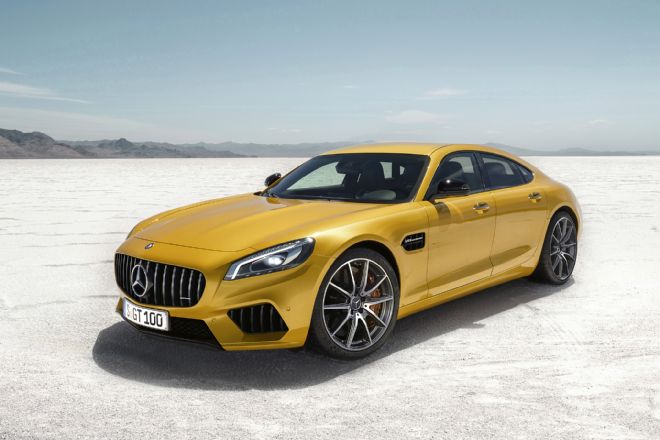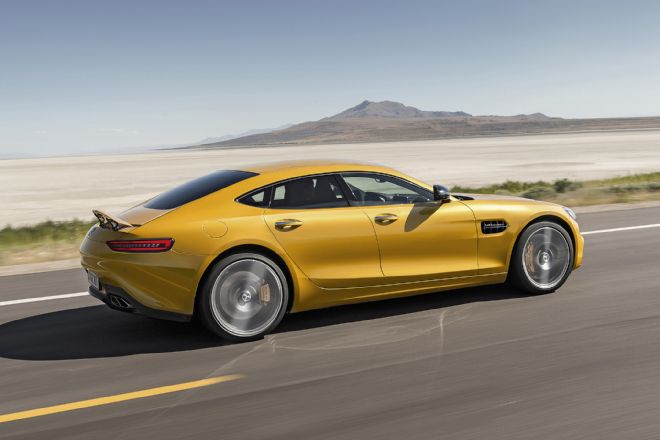Mercedes-AMG plans to take on the Audi RS 7, BMW M6 Gran Coupe, and Porsche Panamera with its new GT4. Despite the name, the GT4 is not a stretched version of the GT Coupe with four doors and four seats. It’s a striking AMG-only vehicle that fuses the dynamic talents of the AMG GT with the architecture of the next-generation Mercedes-Benz CLS-Class (due in 2018).
The Mercedes-AMG GT4 will share its body structure, wheelbase, and chassis with the three-box CLS replacement, code-named C257, but the two four-door Benzes won’t share a single piece of sheetmetal and will look very different.
The next Mercedes-Benz CLS-Class is said to look a bit like an E-Class after an extensive nip-tuck session, while the design of the GT4 was inspired by the two-seater AMG coupe. The GT4 bears all the insignia of a classic GT: wide track, imposing stance, low, slim greenhouse, aggressive front end, and comparatively small footprint. Unlike the
Aston Martin Rapide, the four-door AMG coupe should be quite roomy, easy to get in and out of, and highly maneuverable thanks to relatively compact dimensions.
The GT4’s exterior has a single character line that runs the full length of the car, which is unlike almost all current Mercedes models. Also new are the sculpted flared fenders, the three-dimensionally tapered bumpers, and the so-called Panamericana grille. Instead of a single crossbar, the intake air is channeled through a dozen or so vertical chrome elements. To accommodate four full-size suitcases, the rear end is longer, taller, and wider than the 911-like posterior of the GT. Although the car doesn’t need a wing, marketing has insisted on an eye-catching motorized tail rudder, aerodynamically necessary or not.
The lavish interior is being laid out from scratch and should strike a strong balance between sportiness and luxury, sources say. The quality of the materials and the range of options are said to be classy enough that the car could even — hypothetically — merit a Maybach badge.
Despite similar, swoopy looks, the GT and GT4 will have little shared. The GT was derived from the high-strung SLS while the GT4 is, in essence, a sexier E-Class sedan. Compared to the Mercedes-AMG GT, the GT4 measures a foot longer, has a longer wheelbase, and will be more than 4 inches taller. To achieve a balanced weight distribution, the engine and transmission of the four-door version sit as close to the firewall as possible. The GT4’s short overhangs and aluminum-intensive structure help lower its center of gravity, which should put its grip and handling prowess on par with a proper sports car.
It would make a lot of sense for the Mercedes-AMG GT4 to crib its steering, brakes, and chassis from the Mercedes E63 AMG S replacement due in 2017. Among the extras believed to be under development for the GT4 are adaptive air suspension, an electronically controlled differential, dynamic engine mounts, and carbon-ceramic brakes. The transmission is the familiar nine-speed automatic with a wet takeoff clutch, and the gearbox will have the provisions for the addition of a hybrid module in the future.
We expect two different versions of the Mercedes-AMG GT4, base and S. In both cases, the more frugal 4.0-liter, twin-turbo V-8 from other AMGs will provide motivation. As far as power output, around 500 hp from the base and 600 hp from the S are realistic estimates. The GT4 S should be able to storm to 60 mph in about 3.4 seconds. Expect starting prices of the $132,000-$154,000 range, with 4Matic all-wheel drive available for a little bit extra.






























